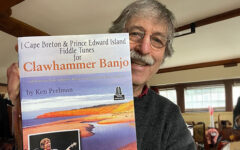 Slate.com recently ran an article about Steve Martin entitled: Late-Period Steve Martin. The subtitle proves helpful in understanding what the piece is about: How to understand the actor, novelist, essayist, playwright, banjo player, crotch-centric variety show performer, and Oscar co-host.
Slate.com recently ran an article about Steve Martin entitled: Late-Period Steve Martin. The subtitle proves helpful in understanding what the piece is about: How to understand the actor, novelist, essayist, playwright, banjo player, crotch-centric variety show performer, and Oscar co-host.
The author’s concern is to answer the question of how? While his more recent efforts in film, music, comedy, and the arts seem to be haphazard, with many proving commercially and critically unsuccessful, while many of his contemporaries have faded from the entertainment limelight, how has Steve Martin managed to remain popular, successful, and in demand? The author maintains that the answer lies in Martin’s unique comic style which relys on the collision of nostalgia with the modern world.
He is a nostalgia artist. From the years of his first wild ascent, his signature has been to reach toward a lost cultural moment and remake it in his own time. The collision of those two worlds, past and present, gives his comedy its distinctive flavor.
While closing his argument that such is indeed the case, the author mentions Martin’s foray into the world of bluegrass music as an element of nostalgic in which the artist has indulged himself.
Let’s be honest: What’s more quaint, and out-of-time, and culturally beside-the-point than bluegrass?
This comment has stirred up quite a fervor among the online citizens of our little corner of the cultural landscape known as bluegrass. At first glance, it does seem offensive to those of us who value bluegrass music as being very much in time and culturally relevant. But before we get out the pitchforks and head off to find the author of this piece, I suggest we think about this statement carefully.
The author is only expressing his understanding and viewpoint of bluegrass music. He finds it “quaint” and “culturally beside-the-point” but that doesn’t make it so, it means that is his perception of our beloved genre. And it’s a perception he does not hold in isolation. There has been, in recent years, an increase in the number of young people playing bluegrass, but still, any teenaged boy will tell you that publicly admitting to playing the banjo won’t have a positive outcome on your dating life.
Like it or not, the perception held by this Slate.com author is held by many. What we need to do is learn a lesson from Steve Martin. If the author is correct, Martin makes a very good living by causing people to see, and laugh at, the collision between our modern world and the one they remember from days gone by, and sentimentally long for as a better place. I believe bluegrass music can do one better. Bluegrass music does carry with it deeply rooted historic virtues that people do long for in our modern world.
These historic elements of the music are not beside-the-point. They are quite applicable to the world we live in today. Hay bales? Probably not, for a lot of people. Feelings of grief and sorrow? Love and loss? Longing for a simpler life? Loyalty to family and friends? These are very much experienced and valued by people regardless of culture or time period.
If audiences can be given an understanding of bluegrass music, not as irrelevant, “culturally beside-the-point” nostalgia, but rather as very much to-the-point cultural art, which yes, carries elements of nostalgia but which also intersects with our modern lives in a relevant and entertaining (that’s what music is after all) way, then perhaps misunderstandings such as this one will no longer occur.







